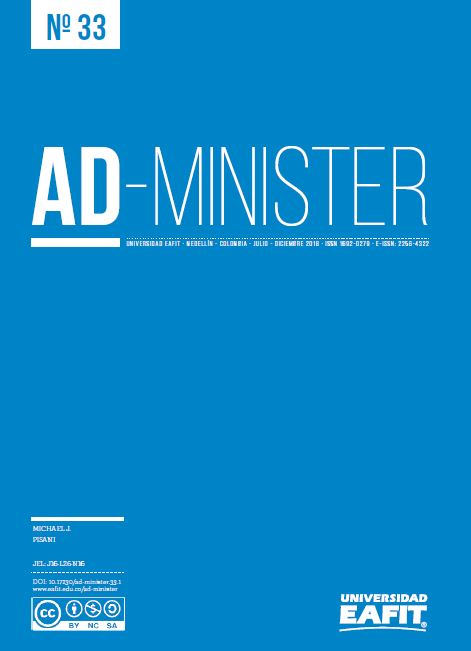Contemporary Female Entrepreneurship in Nicaragua
Main Article Content
Keywords
Female Entrepreneurship, Nicaragua
Abstract
Women are important entrepreneurial actors within the Nicaraguan economic ecosystem. Majority female-owned firms comprise 32.7% of all urban Nicaraguan formal enterprises; these ownership rates far exceed the regional (21.8%) or global averages (14.5%). Within Nicaragua, self-employment rates for women (43.3%) surpass that of men (28.3%). This article describes the contemporary Nicaraguan entrepreneurial landscape for female-owned enterprises using the 2016 Nicaraguan Enterprise Survey of 333 formal sector urban-based firms conducted by the World Bank. Principal multivariate results include the concentration of female top management with majority female-ownership, the role of the informal sector in spawning formal female enterprises, and size constraints of female-owned enterprises.
Downloads
References
Banco Central de Nicaragua (2017). Estado de la economía y perspectivas 2017. Retrieved from http://www.bcn.gob.ni/publicaciones/periodicidad/eventual/economia/Estado_Economia_sep2017.pdf.
Brenes Narváez, A. & Cruz Rivera, F. (2016). Determinantes de la Informalidad en Nicaragua. Revista de Economía y Finanzas, 3(November), 111-152.
Frutos-Bencze, D. (2017). Central American family business groups: Internationalisation and diversification strategies. International Journal of Business and Emerging Markets, 9(3), 198-215.
INIDE (Instituto Nacional de Informacíon de Desarollo) (2017). Informe de empleo encuesta continua de hogares (ECH) II trimeste 2017. Retrieved from http://www.inide.gob.ni/ECH/Publicacion%20ECH%20II%20trimestre%202017.pdf.
Jennings, J. E. & Brush, C. G. (2013). Research on women entrepreneurs: Challenges to (and from) the broader entrepreneurship literature? The Academy of Management Annals, 7(1), 663-715.
Langowitz, N. & Minniti, M. (2007). The entrepreneurial propensity of women. Entrepreneurship Theory and Practice, 31(3), 341-364.
Marlow, S. & Martinez Dy, A. (2017). Annual review article: Is it time to rethink the gender agenda in entrepreneurship research. International Small Business Journal: Researching Entrepreneurship, 35(8), 1-20.
Oser, B., Spence, M., Riding, A. & Carrington, C. A. (2010). Gender and export propensity. Entrepreneurship Theory and Practice, 34(5), 933-957.
Pisani, Michael J. (2016), “Disadvantaged? Informal female entrepreneurs operating tienditas in Nicaragua,” Ensayos Revista de Economía, 35(2), 195-223.
Pisani, M. J. (2006). Nicaraguan self-employed women under neoliberalism: Characteristics and determinants. Latin American Business Review, 7(1), 89-106.
Pisani, M. J., Guzman, J. M., Richardson, C., Sepulveda, C., & Laulié, L. (2017). Small business enterprises and Latino entrepreneurship: An enclave or mainstream activity in South Texas? Journal of International Entrepreneurship, 15(3), 295-323.
Pisani, M. J., & Pagán, J. A. (2004). Sectoral selection and informality: A Nicaraguan case study. Review of Development Economics, 8(4), 541-556.
Pisani, M. J., & Yoskowitz, D. W. (2012). A study of small neighborhood tienditas in Central America. Latin American Research Review, 47(4), 116-138.
Rivas, E. (2017a). ¿Emprendedoras? Sí se puede. Confidencial, Janaury 30. Retrieved from https://confidencial.com.ni/emprendedores-se-puede/.
Rivas, E. (2017b). De estudiantes a emprendedaors. Niú, March 3. Retrieved from http://niu.com.ni/de-estudiantes-a-emprendedoras/.
Santiago-Castro, M., & Pisani, M. J. (2013). An initial review of the characteristics and determinants of female entrepreneurs in Puerto Rico. AD-minister, 23 (2), 131-150.
Sanz, L. J., & Lazzaroni, M. (2008). Agora Partnerships, structuring a seed stage investment in Nicaragua: Launching new ventures in emerging markets. Academia, Revista Latinoamericana de Administración, 40(1), 83-113.
Welter, F. (2011). Contextualizing entrepreneurship—Conceptual challenges and ways forward. Entrepreneurship Theory and Practice, 35(1), 165-184.
Williams, C. C., Martinez-Perez, A., & Kedir, A. M. (2017). Informal entrepreneurship in developing economies: The impacts of starting up unregistered on firm performance. Entrepreneurship Theory and Practice, 41(5), 773-799.
World Bank (2017a). Doing business 2017: Nicaragua. World Bank Publications.
World Bank (2017b). Doing business: Measuring business regulations. Retrieved from http://www.doingbusiness.org/rankings.
World Bank (2017c). The Nicaragua 2016 enterprise surveys data set. Retrieved from http://www.enterprisesurveys.org/data.
World Bank (2017d). Gender: Enterprise surveys. Retrieved from http://www.enterprisesurveys.org/Data/ExploreTopics/gender.
World Bank Group (2017). Enterprise surveys: About us. Retrieved from http://www.enterprisesurveys.org/about-us.
Xavier, S. R., Kelley, D., Kew, J., Herrington, M., & Vorderwülbecke, A. (2012). Global entrepreneurship monitor 2012 global report. Retrieved from http://www.gemconsortium.org/report.

